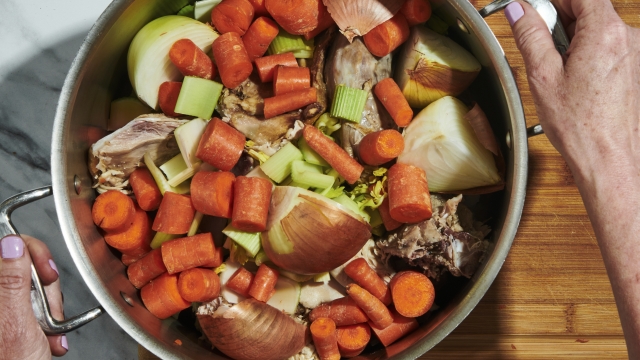According to Feeding America, 119 billion pounds of food is wasted every year in the United States. That adds up to 130 billion meals — and $408 billion — tossed into landfills.
"In the United States, we throw out 40% of the food that's produced," said Diane Letson, vice president of food industry partnerships at Feeding America. "When we think of food waste, we think of food that is still fit for human consumption but for whatever reason that business has decided, OK, this food can no longer go to my primary consumer, so it becomes food waste."
Feeding America is just one nonprofit fighting to end food waste, and with that an even bigger problem: Hunger.
Last year the company rescued 3.6 billion pounds of groceries, and provided food for more than 36 million Americans in need.
"We want that food to go to its intended purpose or use," said Letson.
And many nonprofits around the country are echoing that sentiment.
"We distributed last year 4.1 million pounds of food. That's the equivalent of about 3.2 million meals. And to put that in perspective for you, I think the Mercedes Benz stadium (in Atlanta) holds around 75,000 people. That's enough meals to provide them food, three meals a day, for 15 days," said Paul Clements, executive director of Second Helpings Atlanta.
Second Helpings Atlanta, or SHA, is making a difference one rescued meal at a time. It has a network of volunteers who pick up, pack and deliver meals to the community.
SEE MORE: Inflation rate increases for first time in over a year
"I have been volunteering for 10 years. I keep hearing that there's enough food wasted in this country to feed everybody. This is the perfect type of organization that would share that waste with those who need it," said Jean Millkey, a volunteer with Second Helpings.
SHA implemented programs to share food with the community, including Meals with Meaning, a partnership with the city of Atlanta and HelloFresh.
"These are the same meal kits ... that if you were to go on the HelloFresh website and order a meal for you and your family. We are packing 2,000 every day. They actually contain enough for four plates. So, four meals, which is the equivalent of 8,000 meals we're distributing every Wednesday," said Clements.
SHA also partners with major retailers including Whole Foods and Trader Joe's.
"They don't want to throw it away. They want to make sure it gets into the people in their neighborhoods located immediately around their source, the people who need it. And that's where we step in," said Clements.
"We meet some of the people that actually get the food and how appreciative they are. And also, looking at everything that would be thrown away is amazing. The quality — it's amazing food that doesn't go to waste," said Gloria Copeland, a volunteer with Second Helpings.
And it's not just grocery stores that have a surplus of food. Wellstar Hospitals donate their café leftovers using the food waste solution, Goodr.
"From July of last year to July of this year we donated 4,000 meals. It's basically 100 meals a week that we donate," said Deborah Phillips, the assistant manager of Nutrition Food Services at Wellstar.
SEE MORE: More Americans are living paycheck to paycheck, report says
"To be able to see that, it makes you feel really good inside knowing that there is somewhere that you can actually take the food and help people," said Ken Hampton, the executive chef at Wellstar.
Goodr offers donors data to show them the good they are doing for their communities.
"It also helps them source-reduce. Because now they are like 'Hey I'm seeing what I'm wasting a lot.' And they can make less of that item and waste less of it," said Jasmine Crowe-Houston, Goodr Founder and CEO.
"It's easy to do. You package it, you send it out and you feel so much better. The time it took me to do that is the same time to throw it in the trash, but this is going to help someone," said Hampton.
According to Feeding America, 53 million people turned to food banks and other food programs in 2021.
"Eighty percent of our 200 food banks said they're still seeing elevated need and elevated demand," said Letson.
There are people in every county in this country who experience food insecurity. And the answer to eliminating food waste and helping resolve that problem — starts with you.
"It's a lot of food, a lot of waste, and yet there are millions of people that are going to go to bed hungry tonight," said Crowe-Houston. "The average family is wasting somewhere near around 1,600 pounds of food a year, which seems like insane."
"At home be mindful in your shopping, eat your leftovers," said Letson.
"Put it to use somehow, even if it needs to be composted, that's being useful," said Millkey.
"It takes a village" is a cliché, but it's accurate. Thirty-four million people, including 9 million children in the U.S. live in households that are food-insecure. Second Helpings Atlanta is working to change that.
"When I think about the good work that we're doing, I envision a family sitting around a dinner table at night having great food, not having to worry about where their meal is coming from and just making great memories," said Clements.
Trending stories at Scrippsnews.com




